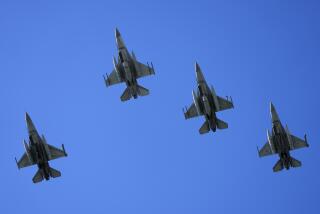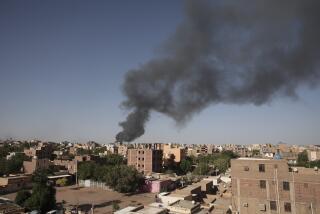Where’s the air support?
- Share via
The list of countries responsible for the humanitarian crisis in Darfur is a long one, topped by the repressive government of Sudan but including such players as China, whose purchase of Sudanese oil keeps the Khartoum regime afloat, and Russia, which consistently blocks attempts to impose sanctions. Less frequently mentioned are those nations that are aware of the ongoing genocide but turn away when asked to do anything about it. A new report will make it harder for them to hide.
The United Nations’ peacekeeping mission in Darfur is foundering. The force is ill-equipped, dangerously undermanned and mostly ineffective at protecting civilians from a motley collection of roving militias, Sudanese soldiers, rebels and bandits. But perhaps most problematic is the mission’s lack of helicopters, which are desperately needed to effectively patrol a region the size of France.
Although the U.N. has requested 18 helicopters, not a single member nation has agreed to contribute. That makes it tough to evacuate casualties or respond rapidly to threats, such as the July 8 attack on U.N. forces that left seven peacekeepers dead.
After crying out about the dearth of helicopters to no avail, a group of nongovernmental organizations focused on Darfur has decided to try a bit of public shaming. A report introduced by the Elders, the do-gooding elder statesmen led by former President Carter and crusading South African Archbishop Desmond Tutu, has identified precisely how many surplus helicopters various U.N. member states own that would be appropriate for deployment to Darfur. The hall of shame for countries failing to live up to their humanitarian obligations includes India (with 20 available), Ukraine, the Czech Republic, Italy, Romania and Spain; between them, these countries could supply more than 70 helicopters.
Though the report found that the United States would be capable of sending up to 30 choppers, this country already has pressing commitments in Iraq and Afghanistan; moreover, it’s widely believed that a U.S. contribution would be politically incendiary, adding fuel to Sudanese President Omar Hassan Ahmed Bashir’s attempts to characterize the international response to Darfur as a U.S.-led neocolonial crusade.
That puts the onus on emerging countries that aren’t accustomed to taking a leadership role in international crises. Yet, if the likes of India and Ukraine want to be taken seriously as responsible members of the community of nations, they need to start acting as if they were.
More to Read
Sign up for Essential California
The most important California stories and recommendations in your inbox every morning.
You may occasionally receive promotional content from the Los Angeles Times.













